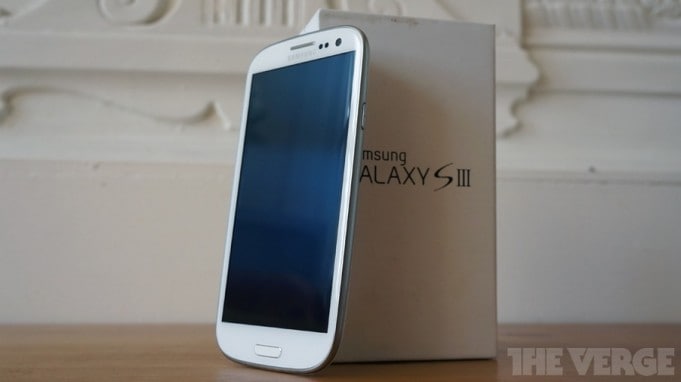Big expectations and the Samsung Galaxy S III were synonymous for the better part of this year, leading up to the flagship Android’s announcement in London earlier this month. So far, Samsung appears to have nailed it. The smartphone is receiving glowing reviews (The Verge: “Unequaled performance” 8.5/10). Pre-orders are through the roof and reportedly the “most ever for an Android phone.”
But perhaps what’s most interesting about this highly anticipated smartphone from Samsung is that it could be the first Android to convert masses of iPhone users to Google’s mobile OS.
Anecdotally I’ve heard from more than one friend, and seen several posts on Twitter and Facebook about disgruntled users potentially making the switch from an iPhone to the S III. In addition to calling it the best Android on the market, the Telegraph suggests that “even iPhone users should take a look.”
I don’t expect a sea change, and, no question, Apple’s not about to go the way of the Palm anytime soon (or ever). Still, there’s a sense that with Google’s impending self-branded Android 5/tablet launch, and the incredible demand seen with this Samsung smartphone, that the potential to score market share hits against Apple is not the impossibility many suspect.
There’s several reasons why iPhone users are converting to the Samsung S III:
1. Screen Size
Want a bigger screen than 3.5-inches? Scratch the iPhone off your list. It only comes in one size (but two colors!). Meanwhile Android is a Vegas buffet by comparison with sizes available across several manufacturers all the way up to the Galaxy Note’s 5.3-inches (also available in two colors!).
2. Android is finally as easy to use as iOS
In the early days, circa 2009-2010, Android was a techy stew. Not so today. Android 4.0 “Ice Cream Sandwich” (though penetration is still extremely low) and even its far more popular predecessor Android 2.3.x “Gingerbread” have made significant inroads in ease-of-use. Better still Google’s app market (now called Google Play) finally does not feel like walking through a bad neighborhood.
3. Android is more customizable, personable
Widgets are a huge plus for Android. They allow you to be more productive. For example, you can add CNN headlines to your homescreen, or the weather forecast, or the latest sports scores. There are thousands of possibilities, none of which are available on the iPhone which instead offers only a boring grid of icons.
4. Speed
Android, and the Samsung S III in particular, bests the iPhone 4S in two ways when it comes to speed. First, overall performance, thanks to a quad-core processor, is simply unparalleled. It blows the iPhone away (Google the benchmarks for the nitty gritty). Beyond that, there’s 4G/LTE. Blazing cellular data speeds are not available to iPhone users who are stuck with the markedly slower 3G service. Sad that.
5. Slim is in
Hold an iPhone 4S next to a Samsung Galaxy S III (or even the S II), and you’ll immediately notice something surprising: the iPhone is a chunky little bugger. In fact the iPhone 3 line, thanks to its elegantly rounded case, could be considered the better design. When it comes to slim there’s no beating Android; the Moto RAZR led the charge earlier this year, and now the S III too proves that you needn’t carry a small brick around to get terrific performance.
Beyond these features and design differences, there’s something else in play.
At CES in January we heard one Android maker after another say they’d launch fewer models. 2011 was a mess when it came to new Android smartphones. Consumer confusion reigned supreme, and many (including myself) kept waiting “just a few more weeks” for the next big thing to hit our local Verizon, AT&T and T-Mobile stores. In fact, I’m still running an OG Moto Droid (2009) and now an eager to upgrade to the S III el pronto. Thankfully manufacturers are slowing the release cycle. It’s important to avoid flooding the market, not only to prevent consumers from delaying buying decisions, but also for putting marketing muscle behind individual model launches.
Case in point: this very Samsung Galaxy S III.
Like Apple, Samsung is releasing a new model only once per year. The result is laser focus. These press release/presentation style launches were invented by Steve Jobs and Apple, and have proved hugely successful in building excitement, generating buzz, garnering headlines. I suspect Google will do something similar with Android 5 and its self-branded 7-inch tablet (Asustek) that we should see next month.


